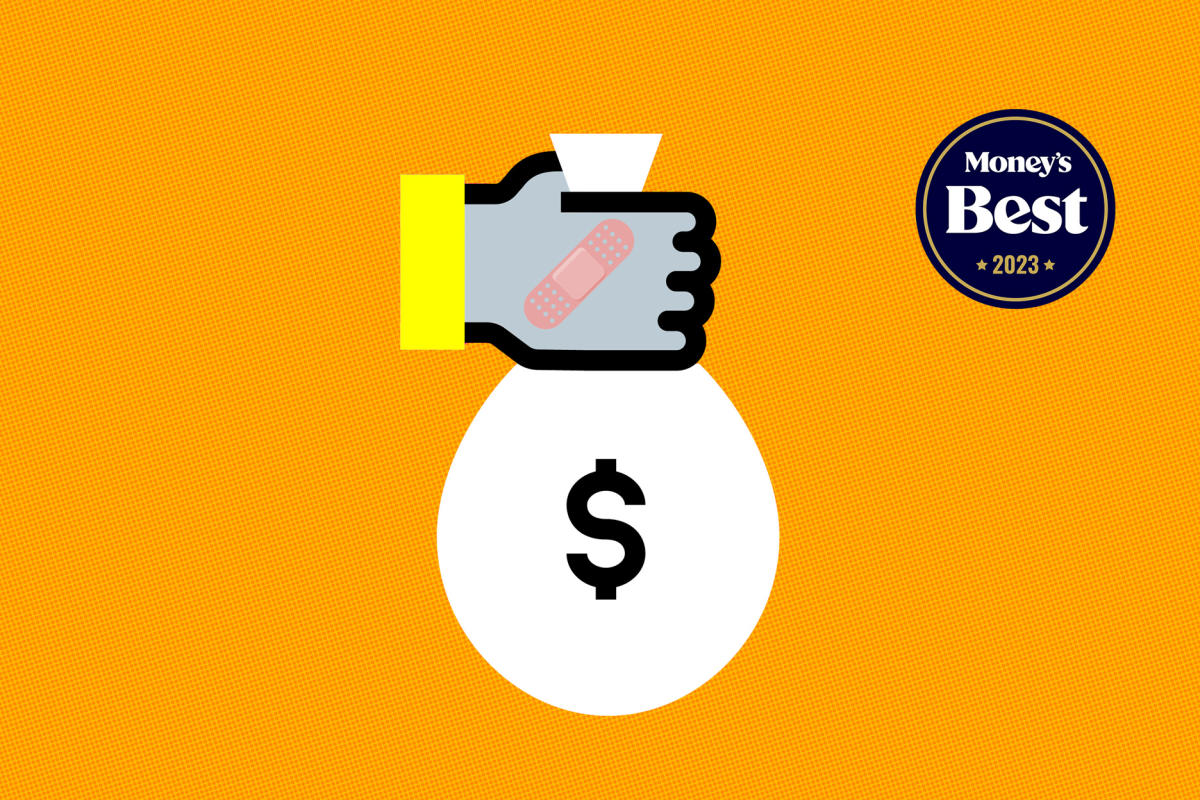Personal Finance
Best Loans for Bad Credit of 2023

Our Partners
Top Partner
Our Partner
Get Started
-
Get personalized pre-qualified offers from multiple lenders.
-
2 Minute Process
-
$600 – $100,000 loans.
-
Rates from 5.40% – 35.99% APR
-
Loan terms of 1 to 7 years.
-
Rated A+ by the BBB
Our Partner
Get Started
-
Personal Loans up to $50,000
-
Rates from 2.49% – 35.99% APR
-
Funds as fast as 24 hours
-
Loan terms of 3 mo – 15 years
-
Easy to compare then apply
-
Credit Score: Excellent/Good/Fair/Poor
Sample loan: a four-year $20,000 loan with an interest rate of 2.49% and an APR of 2.49% will require an estimated monthly payment of $561.60 and a total cost of $26,956.57.
Our Partner
Get Started
-
Loan Amount: $1,000 – $100,000
-
APR: 5.99% – 35.99%
-
Loan Term: 3 – 120 months
-
Explore all your options at once and find the best offers for you.
-
You can get your funds in as little as 1 day from approval.
-
Loan consultants available to help you understand your options.
Sample loan: a four-year $15,000 loan with an interest rate of 15.49% and an APR of 18.34% will require an estimated monthly payment of $421.20 and a total cost of $20,217.43.
Our Partner
Get Started
-
A+ Rating with the BBB. Free service to help you find the right loan for your needs.
-
Loan amounts of $1,000 – $35,000 for any credit type!
-
Pay it back in 3 mo – 6 years depending on lender terms.
-
Rates from 5.99% – 35.99% APR.
-
Loans for any purpose! Students, Cars, Vacations & more!
Our Partner
Get Started
-
Marketplace for all types of loans
-
Get $500-$5,000 in one business day
-
Rates fluctuate from 5.99% to 35.99%
-
Loan terms between 3-36 months
-
Compare loan offers without obligation to accept them
-
No collateral needed
Getting a loan can be difficult if you have less-than-stellar credit. Most banks and credit unions may reject your application, limiting your options to expensive loan offers. However, some online lenders offer favorable terms to those who don’t qualify for most personal loans.
Here are our picks for the best bad credit loan companies, which can offer better approval odds and reasonable terms.
Money’s Top Picks of the Best Loans for Bad Credit of 2023
-
OneMain Financial – Best for secured loans
-
Upstart – Best for people with short credit history
-
Upgrade – Best for joint application loans
-
Lending Tree – Best online lending marketplace
Best Loans for Bad Credit Reviews
Pros
-
Offers co-signed loans
-
Same-day funding available
-
Mobile app lets you manage your loan and track credit score
-
Over 1,000 branches across 44 states
Cons
-
High starting APR compared to other companies
-
Low maximum loan amount of $20,000
HIGHLIGHTS
- Term lengths
- Loan Amounts
- APR
- Origination Fee
- Minimum Credit Score Required
Why we chose it: Most bad credit lenders don’t offer secured loans — that is, personal loans guaranteed by an asset, such as a savings account or car. OneMain Financial, on the other hand, has both unsecured and secured loans available for high-risk borrowers.
Secured loans are usually easier to qualify for because the collateral guarantees creditors get repaid if you default on the loan. And, if you have poor credit, applying for a secured loan can improve your odds of getting approved and might even get you better rates. You can get approved for a OneMain Financial secured loan by using your car, RV, motorcycle or a boat as a payment guarantee.
Fast funding is another one of OneMain Financial’s benefits. Most loan providers disburse funds the next business day after your application is approved. OneMain, on the other hand, says it can transfer your money the same day if you get approved by noon. (This funding option is available only if you have a bank-issued debit card. If you opt for a bank account transfer, it will take around one or two business days after the loan closing date.)
HIGHLIGHTS
- Term Lengths
- Loan Amounts
- APR
- Origination Fee
- Late payment fee
- Minimum Credit Score Required
Pros
-
Accepts people with lower credit scores and shorter credit histories
-
Loans can be used to fund education-related expenses
-
Origination fees as low as 0%
Cons
-
Only two repayment options (3 and 5 years)
-
No mobile app or credit score tracker
Why we chose it: Many applicants get rejected for a loan because of a short credit history. Upstart, on the other hand, uses alternative data and artificial intelligence to evaluate people with poor or little credit.
The company’s loan approval process relies on an applicant’s job and school background in addition to their credit information. This can help people with a short credit report but a solid educational background get an excellent loan offer, for example. However, you could still get rejected if you have a low score plus a history of missed payments or charge-offs on your report.
In 2017, at the behest of the Consumer Financial Protection Bureau (CFPB), Upstart agreed to analyze how its loan approval process compares to the one used by traditional lenders. The CFPB later issued a no-action letter to Upstart that required the lender to notify the bureau of changes to its artificial intelligence — said letter was terminated just recently, in June 2022.
According to the results shared with the CFPB, Upstart’s tests show that the company approves around 27% more loans than traditional lenders, and their loans’ APRs are about 16% lower.
Pros
-
Rate discount with autopay
-
Wide range of loan terms available
-
Secured loans available
Cons
-
Higher maximum origination fee than other companies
HIGHLIGHTS
- Term Lengths
- Loan Amounts
- APR
- Origination Fee
- Late payment fee
- Minimum Credit Score Required
Why we chose it: Upgrade allows co-borrowers, which can improve your chances of approval if the second borrower has a better credit score.
Besides improving approval odds, with a joint application you might get approved for a higher loan amount and lower interest rates. However, keep in mind that with joint applications, both people share responsibility for the monthly loan payments. If neither makes payments on time, it can impact both people’s credit scores.
Upgrade is also an excellent option for people who want to consolidate their debt. You can technically use any personal loan for debt consolidation — taking out a new loan to pay off multiple existing debts. However, you would be in charge of paying each lender individually once you receive the loan funds. Upgrade, on the other hand, can simplify the debt consolidation process by paying your creditors directly.
Upgrade also operates Universal Credit, another online lender with low minimum credit score requirements (560). Universal credit offers debt consolidation loans, but note that the company has a higher minimum APR and origination fee than Upgrade.
Pros
-
Compare multiple companies at once
-
Offers plenty of financial education resources
Cons
-
Can lead to multiple marketing calls or emails from creditors
LendingTree is an online lending marketplace that makes it easier to compare rates and fees from different companies without submitting multiple individual applications.
LendingTree has partnerships with top-rated lenders such as Rocket Loans, SoFi, Marcus and all the companies mentioned in this list. It can connect you with providers of personal, auto or home equity loans whether you have fair or excellent credit.
If you create an account, LendingTree also offers several personal finance tools such as a monthly payment calculator and a budget tracker.
Other companies we considered
LendingClub
Pros
-
Pays creditors directly if you choose a debt consolidation loan
-
Co-borrowers accepted
Cons
-
Only two repayment options available (3 and 5 years)
-
Funding can take two days or more
LendingClub has a lower maximum origination fee (6%) than some of our picks and has a minimum credit score requirement of 600.
Why it didn’t make the cut: Although its stated minimum credit score is 600, a company representative stated that the average credit score of borrowers approved by LendingClub is 700 or more with an average income of around $100,000.
Avant
Why it didn’t make the cut: In 2019, the Federal Trade Commission (FTC) sued Avant for allegedly engaging in unfair loan servicing practices such as withdrawing money from consumers’ accounts and charging their credit cards without authorization.
Pros
-
Accepts multiple payment methods like checks, money orders, credit and debit cards
-
Lower maximum origination fee (up to 4.75%) than many competitors on the list
Cons
-
Sued by the FTC for allegedly deceiving customers
Avant states that most of its customers have a credit score of 600 to 700. FICO scores between 600 and 669 are fair but are considered by some lenders as bad credit scores.
Why it didn’t make the cut: In 2019, the Federal Trade Commission (FTC) sued Avant for allegedly engaging in unfair loan servicing practices such as withdrawing money from consumers’ accounts and charging their credit cards without authorization.
Prosper
Pros
-
Loans up to $40,000
-
Maximum origination fee (5%) lower than other companies
-
Accepts co-applicants
-
Manage loan through mobile app
Cons
-
High minimum credit score requirement
-
Loans available for only 3- or 5-year terms
Prosper is a peer-to-peer lending platform that connects borrowers with individual investors. This system can provide better loan terms compared to traditional lenders in some instances.
Why it didn’t make the cut: However, Prosper requires a minimum score of 640 to apply. While this falls in the Fair range of the FICO scoring system, it is much higher when compared to other online lenders on our list.
Oportun
Pros
-
Accepts co-signers
-
Considers applicants with limited or no credit history
-
Offers secured loans
-
Online live chat available
Cons
-
Limited loan amounts for new customers (typically $500 – $3,500)
-
Only reports payments to two of the three bureaus
-
Loans available in only 26 states
Oportun offers personal loans, including co-signed and secured loan options, to borrowers with little or no credit history.
Why it didn’t make the cut: The lender operates in a limited number of states and reports customer accounts to only two of the three main credit bureaus — TransUnion and Equifax. Having your on-time payments reported to every bureau is a must if you want to improve all of your three credit reports.
LendingPoint
Pros
-
Accepts applicants with credit score below 600
-
Loans available up to $36,500
-
Origination fee as low as 0%
-
Uses alternative data to approve applicants with low or no score
Cons
-
High starting APR (9.99%) compared to similar creditors
-
Does not offer joint or cosigned loans
-
Limited information on FAQ section
LendingPoint uses artificial intelligence to analyze several factors, including the applicant’s location and cost of living, instead of only relying on the traditional loan approval process.
Why it didn’t make the cut: The company has a minimum credit score requirement of 580, but it only reports to two (Experian and TransUnion) of the three main credit bureaus, a drawback for those consumers who are trying to build or repair their credit using a personal loan.
Universal Credit
Pros
-
Rate discount with autopay
-
Loans available up to $50,000
-
Access to financial tools such as credit score simulator
Cons
-
No joint, co-signed or secured loans
Universal Credit has a low minimum credit score requirement (560) and offers debt consolidation loans.
Why it didn’t make the cut: Universal Credit has a higher starting APR (11.69%) and origination fees (5.25%) than other loan providers on our list.
PenFed Credit Union
Pros
-
Broad loan amount range ($600 to $50,000)
-
Joint and secured loans available
-
Mobile app to manage loan information
Cons
-
Requires membership to apply
-
Better suited for people with good credit
PenFed offers loans starting as low as $600 and up to $50,000 with repayment terms of one to five years.
Why it didn’t make the cut: Applicants with bad credit scores could have a harder time getting approved with PenFed than with other companies in our list.
Personal Loans for Bad Credit Guide
Loans can be lifesavers, especially when unexpected expenses arise. Qualifying for one is also an excellent opportunity to improve your credit rating if you make timely payments. However, it’s important to know how to compare loan offers and lenders.
Read on to find out how to choose the best personal loans for bad credit and how these loans work.
What are loans for bad credit?
Bad credit loans let individuals with poor or no credit history borrow a set amount of money and repay it, plus interest, in fixed monthly payments over the loan’s term. However, these fixed-rate installment loans usually have higher interest rates.
While many lenders are hesitant to offer loans to people with bad credit, some do offer options for individuals that are considered high-risk borrowers. In some instances, these loans can provide an excellent opportunity to consolidate credit card debt or for emergencies. Paying a loan on time can also help boost your credit score as it shows creditors you’re responsible when it comes to debt management.
What is a bad credit score?
Most lenders use the FICO credit score model to evaluate potential borrowers and determine interest rates, credit limits and other loan terms. FICO scores range from 300 to 850, where scores between 580 and 669 are fair and anything below 580 is poor.
Most people with credit scores within that range, will have a hard time qualifying for a loan. Many lenders require a FICO score of at least 620 but some will have even higher credit score requirements (700 and up). However, some online lenders have set minimum score requirements as low as 580.
The VantageScore is another credit scoring model, and it’s most often used by free credit monitoring sites (like Credit Karma). In the VantageScore range, anything between 601 and 660 is fair and below 601 is poor. Keep in mind that creditors do not widely use VantageScore so it might not give you an exact picture of what lenders will see when you apply for a loan.
What Is Bad Credit Exactly?
|
Credit Rating |
FICO Score |
Vantage Score |
|
Excellent |
800 + |
901-990 |
|
Very Good |
740-799 |
801-900 |
|
Good |
670-739 |
701-800 |
|
Fair |
580-669 |
601-700 |
|
Poor |
300-579 |
501-600 |
How does a personal loan for bad credit work?
A personal loan for bad credit works similarly to any other personal loan. You’ll have to fill out an application form with personal information such as your name, date of birth and Social Security number. Lenders will also typically ask for supporting documentation such as proof of identity (like your driver’s license or passport), pay stubs, tax returns, bank statements or utility bills.
Approval usually takes a day or less, and you can receive your funds as quickly as the next business day. Minimum loan amounts typically start at $1,000 up to a maximum of around $50,000.
Most lenders let you choose a repayment period, often between two and five years. Note that most lenders allow you to pay off the loan early, but some may charge a prepayment penalty, so you should carefully read the terms before accepting a loan offer.
All lenders charge an APR, or annual percentage rate, which is the yearly interest charged on your balance. The APR range is usually between 5% and 36%, but note that borrowers with bad credit will generally get higher loan rates and fees than individuals with good credit.
Most lenders also charge a loan origination fee, which covers the costs of processing the loan. The origination fee is deducted from your loan proceeds, so you’ll receive less than your approved loan amount.
Types of loans for bad credit
There are a few different types of personal loans to consider; however, not all of these options are easy loans to get for borrowers with a low credit score. Depending on how bad your credit is, all or none of these options might be available to you.
Unsecured loans
Unsecured personal loans don’t require collateral, that is, an asset to guarantee the loan. To determine if you qualify or not, lenders assess several factors such as your credit history and score, income and employment. It can be difficult for individuals with a poor score to qualify for an unsecured loan unless they find a lender willing to work with high-risk borrowers or find a co-borrower with better credit.
Secured loans
Secured loans require collateral as a guarantee for the loan — this could be any valuable asset such as your car, savings account or home. If you were to default on the loan, the lender could take possession of the asset. These types of loans are often easier to qualify for and offer lower interest rates than unsecured loans do. However, before applying, make sure you can make the monthly payments. Missing payments could result in losing what you put up as collateral and damaging your credit score further.
Co-signed loans
With co-signed loans, a second person has the legal obligation to repay the loan if the primary borrower defaults. These often offer better approval odds and rates for people with bad credit if the second borrower has a good credit history and a steady income.
Payday loans
A payday loan is a type of unsecured, short-term loan usually meant to be paid back before your next payday, hence the name. These loans are often for small amounts, around $500, and can have APRs that can be as high as 200%. By way of comparison, interest rates for personal loans usually cap at 30%.
Some people with low credit scores turn to payday loans as they have lenient credit requirements and can provide quick cash . However, their staggeringly high interest rates and additional fees can leave some struggling to pay it back or deciding what bills to pay on time. Failing to pay the loan can trigger additional fees, leading you to borrow more and increasing your debt.
Cash advances for bad credit
Cash advances are a quick and easy way to get a short-term loan. They are offered by credit card issuers and allow you to borrow against your card’s line of credit.
Cash advances don’t require a credit check since they are issued directly through your credit card. However, they usually have higher interest rates when compared to your card’s standard purchase APR. For example, cards can have a 15 – 20% APR for purchases and around 26% for cash advances. Credit card companies also typically charge an additional cash advance fee ranging between 3% to 5% of the loaned amount.
If it takes you a while to pay the cash advance, it could hike up your monthly bill, possibly making it difficult to pay the loan or your regular credit card balance.
How to choose a loan for bad credit
Loans for people with bad credit typically have higher interest rates and fees than other personal loans. However, it’s possible to find reasonable offers. Here are a few tips on how to choose the best loan for you:
Compare eligibility requirements
Some lenders list their eligibility requirements on their websites, usually under their loan descriptions or in the FAQ section. Look for details such as minimum credit scores, minimum income and preferred debt-to-income ratio.
If your top picks don’t disclose this information, keep in mind most bad credit loan lenders prefer credit scores above 580. Also, most lenders favor customers with a debt-to-income (DTI) ratio below 36%.
To calculate your DTI ratio, divide your total monthly debt (mortgage plus auto loan, for example) by your monthly income. For example, if your monthly debt equals $1,000 and your gross monthly income is $3,000, your DTI ratio is 33% (1,000/3,000=0.333).
Compare interest rates, terms and fees
Interest rates for bad credit loans can be as high as 36%. However, it’s possible to find loans with more affordable rates. Compare offers between several companies before formally applying by getting pre-qualified. Also, compare their origination, prepayment and late payment fees.
Repayment terms for personal loans usually range between 24 to 60 months. Keep in mind that a shorter repayment term means that you’ll settle your debt sooner and pay less in interest (although your monthly bill will be higher). A longer repayment term reduces your monthly bill, but you’ll spend more on interest in the long run.
Online vs. brick-and-mortar lenders
Most bad credit loans are issued by online lenders. These usually have more flexible eligibility requirements and lower interest rates than traditional banks. However, their customer service is only available through online forms, email and phone. Some clients may not be comfortable dealing with online-only customer service. The brick-and-mortar presence and in-person customer service provided by traditional banks and credit unions, on the other hand, can make some feel more comfortable when applying for a loan or when a problem arises.
Consider a secured loan or a co-signer
If your loan options are limited, applying for a secured loan or using a co-signer with better credit can boost your approval odds and help you get a better deal.
There are risks to both those approaches, however. With secured loans, the debt is backed by collateral, like a car or house. If you default on your loan, the creditor will seize the asset to settle the remaining balance. When using a co-signer, the person is responsible for paying your loan if you default on it.
Look out for predatory lenders
If you have poor credit, you may be targeted by predatory lenders offering loans without a credit check. Car title and payday loans are some examples of these types of loans. These are typically loans for small amounts but with exceedingly high APRs (they can reach the triple digits) as well as high late fees and penalties.
Other loan offers you receive may be scams so it’s important to verify whether the company is registered in the state it operates. You should also keep in mind that reputable lenders never demand money upfront or offer unclear or confusing terms and fees.
How to get a personal loan with bad credit
Here are the basic steps you should take to get a personal loan with bad credit:
Check your credit report and score
Reviewing your credit report before applying for a loan can help you better understand your approval odds. Checking your credit report can also help you spot inaccurate or outdated financial information that may be impacting your score. Check out our guide on how to read your credit report for tips on how to interpret the information being reported.
You can request a free copy of your report from each of the three main credit reporting agencies through AnnualCreditReport.com. Normally, you are entitled to one free copy per year. However, due to provisions set in place in response to the Covid-19 pandemic, you can access your report weekly through the end of 2023.
Check your credit score
Note that credit scores aren’t included in the free report you receive. To get your FICO score (the most widely used metric), you can purchase a report directly from the credit bureaus or through FICO’s official website. Some banks or credit card issuers also provide it for free.
Some financial websites and apps offer free credit scores. However, the score they provide is based on the VantageScore scoring system, which isn’t a staple amongst creditors and is calculated differently. Some differences between FICO and VantageScore are how much weight the scoring systems put on payment history and credit usage, for example.
Try to increase your score before applying
If getting a loan isn’t urgent, consider trying to improve your score before you apply. If you take the time to repair bad credit before applying for a loan, you could end up saving hundreds — or even thousands — in interest costs.
Boosting your creditworthiness can take months. However, it’s certainly possible to improve your credit score if you follow these tips:
-
Pay your bills on time.
-
Use no more than 30% of your total credit limit (also known as credit utilization ratio).
-
Don’t close your old accounts. Credit scoring models like FICO and VantageScore favor lengthy credit files.
-
Build credit with a secured credit card. These are ideal credit cards for bad credit and can help you improve a poor credit rating if you pay them on time.
-
Check your credit report for errors, such as accounts that don’t belong to you. You can remove items from your credit report yourself or hire a credit repair company. Check out our guide on the best credit repair companies for more information.
Get prequalified
A pre-qualification is a ballpark estimate of your chances of approval based on basic financial information, including your income and current total debt. It provides a general idea of how much money you could get approved for and the interest rate the lender would offer. While these don’t represent an official offer, they’re helpful when comparing loan options.
Pre-qualification is considered a soft credit inquiry, meaning it will not impact your credit score because it’s not tied to a formal application for credit. This lets you check whether you might qualify for a loan with a specific lender while avoiding multiple hard inquiries that can lower your score.
Complete the application
Most lenders let you complete their application online, but what each form asks for can differ. The application usually asks for personal information, such as your name, address, phone number, date of birth and Social Security Number. Lenders might also ask for additional documents like W-2s and pay stubs for proof of annual income and employment.
Latest News on Bad Credit Loans
-
Having a solid credit score improves your chances of getting lower interest rates. Here are some tips to help you improve a low score and, in turn, your loan approval odds: 7 Steps to Improve Your Credit Score Right Now.
-
Even if you have bad credit, you can take some steps to get approved for a mortgage. We discuss your options in How to Buy a House With Bad Credit.
-
Excessive credit card debt can lower your credit score, especially if you miss monthly payments or your credit utilization rate is high. Here are some tips on How To Pay Off Credit Card Debt.
Best Loans for Bad Credit FAQ
Which loan company is the best for bad credit?
Several online lenders extend loans to individuals with a poor or bad credit score. Our list of the best bad credit loan companies includes Upgrade, OneMain Financial, Upstart and LendingClub.
How can I fix my credit score?
Fixing your credit score takes time, but there are steps you can take to start the process. First, make sure to check your credit report throughly to find any inaccurate items, such as accounts that don't belong to you. Focus on reducing your overall debt, paying items in collections and keeping your credit utilization ratio below 30%. It's also best to avoid applying for new loans or credit cards unless absolutely necessary.
When is debt consolidation a good idea?
Debt consolidation can be a good idea if you have multiple debts with high interest rates. A debt consolidation loan can often offer lower interest rates and can help you simplify your finances by reducing your monthly payments to a single one.
How to apply for loans with bad credit
It’s important to check your credit score before applying. Lenders who specialize in high-risk borrowers usually require a minimum FICO score of anywhere between 580 and 699. You should also shop around for the best offer by getting prequalified by multiple lenders. If you don’t need the money for an emergency, try to improve your credit before applying for a loan. This could help you save hundreds or even thousands in interest.
What is the difference between a secured and an unsecured loan?
Secured loans require collateral, such as a home or car, to get approved. Some secured loan providers may also accept a savings account or CD account as collateral. These loans are typically easier to obtain and have better annual percentage rates (APR) since the collateral guarantees the lender gets paid in case of a default.
An unsecured loan, on the other hand, does not require collateral. The lender uses the borrower’s credit history and score to determine their creditworthiness. This makes them a more suitable option for people with a good credit score.
How We Chose The Best Bad Credit Lenders
Credit score and odds of approval
The first thing we looked at was whether you’re likely to qualify at all with bad credit. Many lenders have set risk thresholds for other criteria, so you could still be denied based on not having enough free cash flow at the end of the month, among other factors.
We looked for lenders willing to offer loans to borrowers with scores between 580 and 669 in the FICO score range. Do note that most loan lenders aren’t willing to work with customers with scores below 580.
Loan details
We compared interest rates, loan amounts, repayment terms, funding time, disbursement options and additional fees from several banks and online lenders. Our picks offer reasonable terms, no prepayment penalties and better approval odds for individuals with low credit scores who may have difficulty applying for new lines of credit elsewhere.
Credit bureau reporting
Unlike payday lenders, companies on our list report your payments to credit bureaus. Making late payments can harm your credit score further. However, as long as you make your payments on time, you could increase your score, which will make it easier to qualify for loans with more favorable terms in the future.
Consumer satisfaction
We considered the number of complaints each company had with the Consumer Financial Protection Bureau (CFPB) and looked for any history of Federal Trade Commission (FTC) violations. We also took into account customer reviews from reputable sources, like the Better Business Bureau (BBB).
Customer experience
We favored companies that provide online pre-qualification forms, a streamlined application process, several customer support channels, financial education resources or a mobile app to manage loan payments.
Summary of Money’s Best Loans for Bad Credit of 2023
-
OneMain Financial – Best Secured Loans
-
Upstart – Best for people with short credit history
-
Upgrade – Best for joint application loans
-
LendingTree – Best online lending marketplace
© Copyright 2023 Money Group, LLC. All Rights Reserved.
This article originally appeared on Money.com and may contain affiliate links for which Money receives compensation. Opinions expressed in this article are the author’s alone, not those of a third-party entity, and have not been reviewed, approved, or otherwise endorsed. Offers may be subject to change without notice. For more information, read Money’s full disclaimer.
Read the full article here

-

 Personal Finance7 days ago
Personal Finance7 days agoTop personal finance New Year's resolutions for 2025
-

 Passive Income5 days ago
Passive Income5 days agoJoin the Highest-Growing Industry in 2025 With This $60 Cybersecurity E-Learning Bundle
-

 Side Hustles3 days ago
Side Hustles3 days agoAI Agents Are Becoming More Humanlike — and OpenAI Is Launching a New One in January. Are Entrepreneurs Ready to Embrace the Future?
-

 Passive Income3 days ago
Passive Income3 days agoSending A Last-Minute Marketing Email? Follow This 7-Step Checklist to Avoid Making These Costly Mistakes
-

 Investing2 days ago
Investing2 days agoMaersk asks customers to remove cargo before potential strike at US ports By Reuters
-

 Investing2 days ago
Investing2 days agoCheck it Out: An AI Multi-Tool for Any Budget
-

 Make Money6 days ago
Make Money6 days agoHow to Make Money with Print on Demand: A Step-by-Step Guide
-

 Investing7 days ago
Investing7 days agoThe Most Popular Retirement Cities in the US: 2024 Data


















